 Barbu is an elaborate and fun French card game in which the goal changes on every hand. Play of the game combines elements of Whist, Hearts and Fan Tan, among others. The name Barbu, which translates to Bearded One, refers to the King of Hearts, which can play a prominent role in the game. The game is also commonly known as Tafferan or Le Barbu. Barbu is designed to be played by 4 players, each playing for himself.
Barbu uses the standard 52 card deck. The ranking of the cards in this deck used for playing Barbu are as follows (from high to low); Ace, King, Queen, Jack, 10, 9, 8, 7, 6, 5, 4, 3, 2. The suits in this game have no relative ranking; however, certain hands may involve trying to avoid certain cards or suits.
Barbu is an elaborate and fun French card game in which the goal changes on every hand. Play of the game combines elements of Whist, Hearts and Fan Tan, among others. The name Barbu, which translates to Bearded One, refers to the King of Hearts, which can play a prominent role in the game. The game is also commonly known as Tafferan or Le Barbu. Barbu is designed to be played by 4 players, each playing for himself.
Barbu uses the standard 52 card deck. The ranking of the cards in this deck used for playing Barbu are as follows (from high to low); Ace, King, Queen, Jack, 10, 9, 8, 7, 6, 5, 4, 3, 2. The suits in this game have no relative ranking; however, certain hands may involve trying to avoid certain cards or suits.
Determination of the first declarer can be done in a variety of ways, with drawing for high card a common method. The same declarer will actually retain this role for seven consecutive hands, after which the identity of the declarer then rotates to the next player in turn, who also is the declarer for seven hands. This continues until each player has been the declarer exactly seven times, for a total of 28 deals for a complete game. The player to the immediate right of the declarer will perform the duties of the dealer. Once the preliminaries are determined, the dealer shuffles the pack and deals the cards one by one, face down to each player in a clockwise rotation. He will deal out the entire pack in this way, such that each player has a 13 card hand. After examining his hand the current declarer then decides which of seven different game types he will play this hand at. He is required to play one hand of each game type exactly one time (for a total of seven hands). Five of the game types are known as negative games, as they contribute minus values to players hands and two are known as positive games as they add plus values to the players scores. The full menu of game types which each declarer will select from is as follows:
- Nullo: When playing this game type, a player attempts to win as few tricks as possible. The declarer leads the first card and each player then plays one card to the trick. A player must play a card of the same suit as that led to the trick if he has any. If he does not have any, he may play any card from his hand. The highest card of the led suit wins the trick and the player winning each trick leads the first card to the next trick.
After all 13 tricks have been played, the players then determine their scores based on tricks won during the hand. Each trick won during this contract scores the player a -2 point penalty. - No Hearts:
This game type or contract is played similar to Nullo. However, in this game type, the object is to avoid winning tricks containing cards of the Hearts suit. The declarer leads the first card to the first trick.
A player must play a card of the suit led to the trick if they have one. Lacking a card of that suit, they may play any card to the suit. The winner of each trick wins the trick and plays the first card to the next trick. A player may never lead a card of the Hearts suit unless that is the only suit remaining in the player's hand. A player should place all cards of the Heart suit won during the hand face up in front of himself to allow the players to determine which cards of the Hearts suit still remain to be played.
Once all tricks have been completed, the player winning the Ace of Hearts in a trick scores a -6 point penalty, and all other cards won of the Hearts suit scores a -2 point penalty. - No Queens: This game type is also played similar to Nullo, with object in this contract to avoid winning any Queens in tricks.
The declarer leads the first card to the first trick and each other player in turn plays one card to the trick. A player must play a card of the same suit as that led to the trick if they have one. If they do not have such a card, they may play any card from their hand to the trick. The highest card of the suit led to the trick wins it, and it's winner plays the first card to the next trick.
Once all tricks in the hand have been played, each Queen captured in tricks scores the player winning it a -6 point penalty. - Barbu: This contract is played identically to the No Hearts contract, with one exception. The only scoring card in this contract is the King of Hearts. Winning this card in a trick scores a -20 point penalty.
- No Last Two: No Last Two is another contract which is played similar to Nullo with the goal during this game type to avoid winning either or both of the last two tricks.
The play of the hand is identical to the Nullo contract type with regards to leading to and playing to a trick. Once all tricks have been played, scoring on the hand occurs.
The player who wins the ultimate (last) trick scores a -20 point penalty and the player who wins the penultimate trick (second to last) scores a -10 penalty. - Trumps: In this game type, a player attempts to win as many tricks as possible. The declarer calling this game announces a trump suit of their choice and leads any card from their hand. The remaining players in turn, each play one card to the trick. There are a few specific rules that govern play of the hand when playing the "Trump" game.
If the card led to a trick is of the trump suit, each player must play a card of the trump suit if they have one. Additionally, each player must try to win the trick by playing a higher trump card than any played previously to that same trick. If they have cards of the trump suit, but none higher, they may play any trump card to the trick. If the player has no cards of the trump suit, they may play any card from their hand to the trick.
If a non-trump suit card is led to the trick each remaining player must play a card of the suit led to the trick if they have one but are not required to necessarily play a higher card of that same suit. If they have no cards of that suit, they must play a card of the trump suit if they have one. If previous cards of the trump suit have been played, they must also attempt to win the trick by playing a higher trump than any previously played to that trick. If the player has no cards of the led suit or the trump suit they may play any card still remaining in their hand.
Each trick is won by the highest trump card played to the trick. If no trump cards have been played to a trick, it is won by the player who played the highest card of the original suit led to the trick. The winner of each trick leads the first card to the next trick. Once all 13 tricks have been played, the individual players score according to the tricks they have won during the Trump game hand. A player earns +5 points for each trick they have won during the hand, which is then recorded on the score sheet. - Domino: When this game is announced by the declarer, the players attempt to empty their hands before their opponents.
To begin the Domino game hand, the player who declared this contract announces a specific card rank, which will be the cards that will start the foundation piles during this hand. The declarer need not necessarily have any cards of the denomination named. The declarer has the first turn with the turns then continuing in a clockwise direction around the table. On his turn, a player may make any of the following legal plays:
He may play any card of the declarer's announced rank. It should be played on it's own row to start a new foundation.
He may also play a card of the same suit, which is one denomination higher or lower than a card already played to the table. He should play the card to one side of the card he is playing it on, to create an organized layout on the table and facilitate continued play of the hand. Usually, cards descending cards are played to the left of the foundation card and ascending cards are played on the right.
If a player has no legal plays, they must pass and the turn passes to the next player in turn. The hand continues until all cards have been played to the center layout.
The play of the Domino hand is similar to the standalone game titled Fan Tan or Card Dominoes. For a detailed description of the rules for playing Fan Tan, click this How to Play Fan Tan link.
The first player to have run out of cards during the hand earns +45 points, the second to deplete their hand earns +20 and the third to play all their cards earns +5. The last player who retains cards must take a -5 point penalty to their current score.
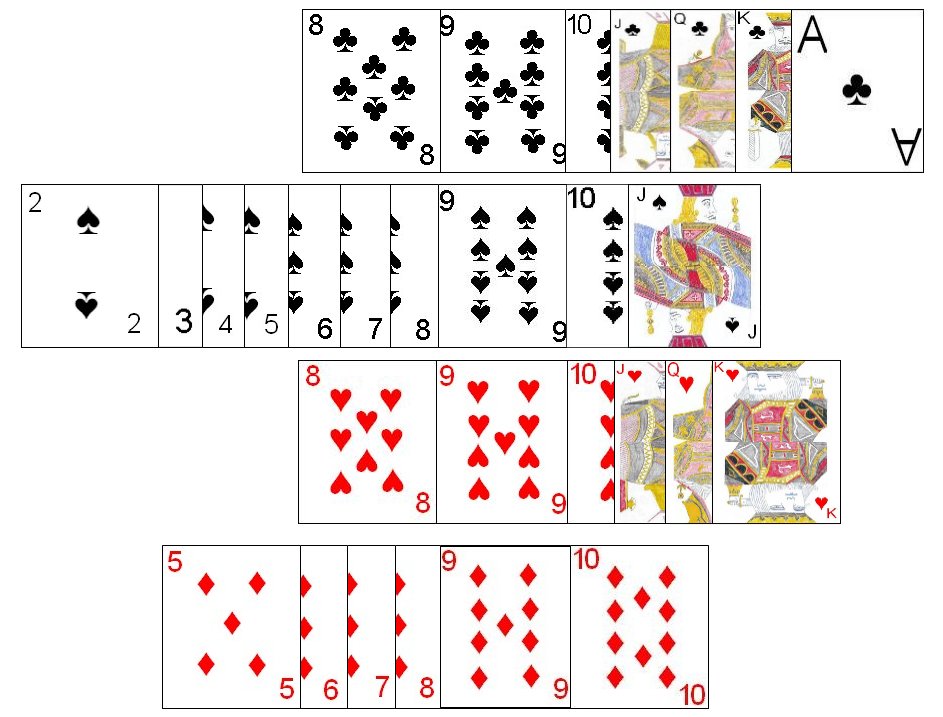 |
| In this example Domino hand in progress, the declarer had thus announced nines to be the starter card in each suit. |
Doubling: Another feature of Barbu is the concept of doubling. Each time the declarer selects their specific contract for the hand, they must allow a moment for any other players to declare a double against one, some or all of his opponents. This opportunity to double is done in one clockwise rotation, starting with the player to the dealer's immediate left. The player may (and should) look at their hand before declaring a double.
When declaring a double, a player must state which other player or players they would like to double. The declarer may never double on his own, but may redouble after first being doubled by that player (see below). The number and specific opponents a player can double is dependent on the game declared. If the declared game is one of the 2 positive scoring games (Trumps or Domino), a player has the option to double any (one or more) of the other players at the table. When one of the 5 negative games is doubled, however, the non-declarer players may only double the declarer. Each player must double the declarer at least two times during that declarer's seven contracts. A player may, on the same hand, double a player who has already doubled him which is commonly called a redouble. When this occurs, each double should be scored individually. Any player, including the declarer, who is first doubled may opt to additionally redouble even if they have already had their turn to double. This redouble further increases the value of the double.
The scoring results of each double is calculated in terms of the players involved in the double and are determined as follows:
Once the hand is completed, all the normal scores should be calculated as normal (including for players who may be involved in a double or redouble). After the regular scoring on the hand is complete, the results of the doubles and redoubles should be calculated between each pair of players. For each set of two players, the player with the higher score for the hand is credited with the difference between the two scores, and the player with the lower score has that difference subtracted from their own score. For a redouble, each player has double the difference added or subtracted as appropriate. If both player's score was the same during the hand no additional points are added or subtracted from either player.
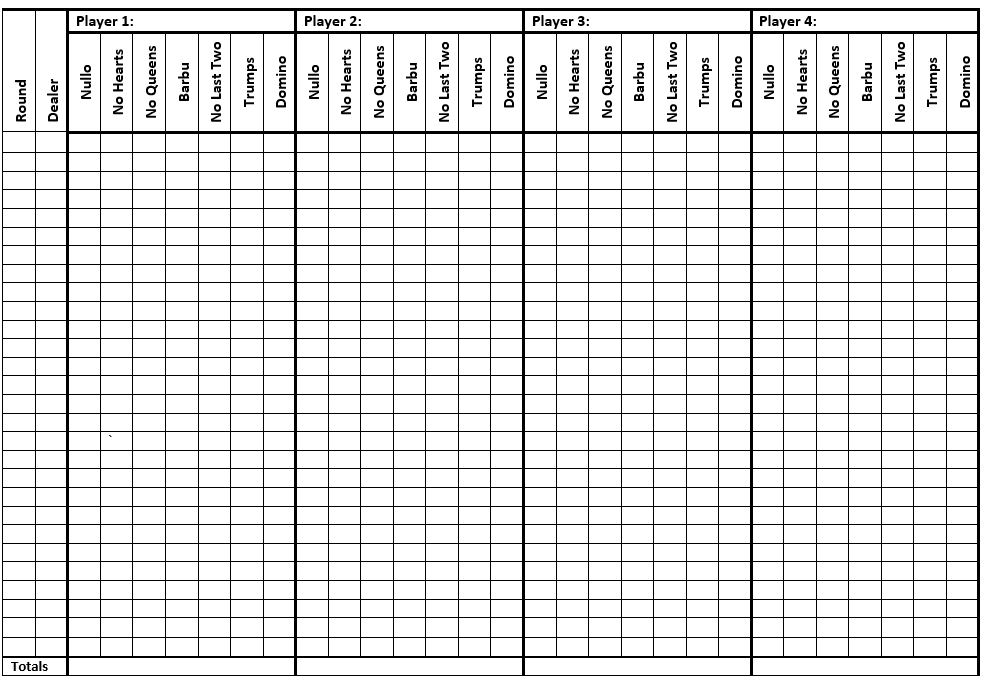 |
| A Blank Barbu Score Sheet. |
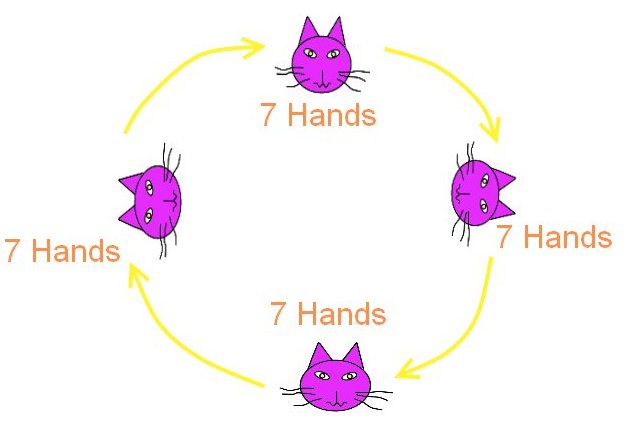
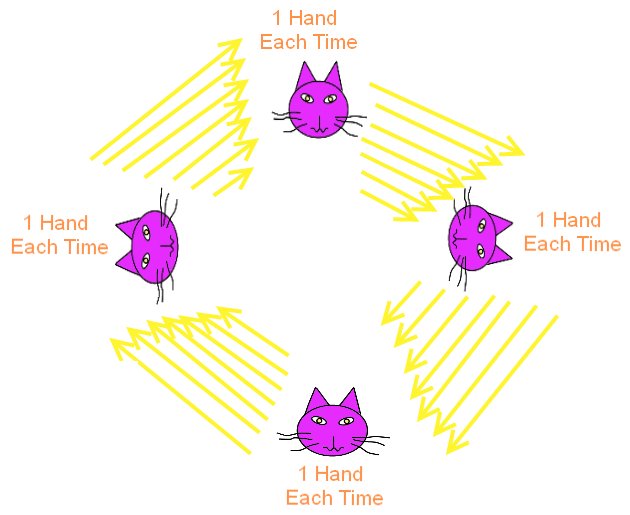
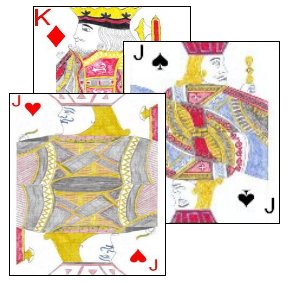
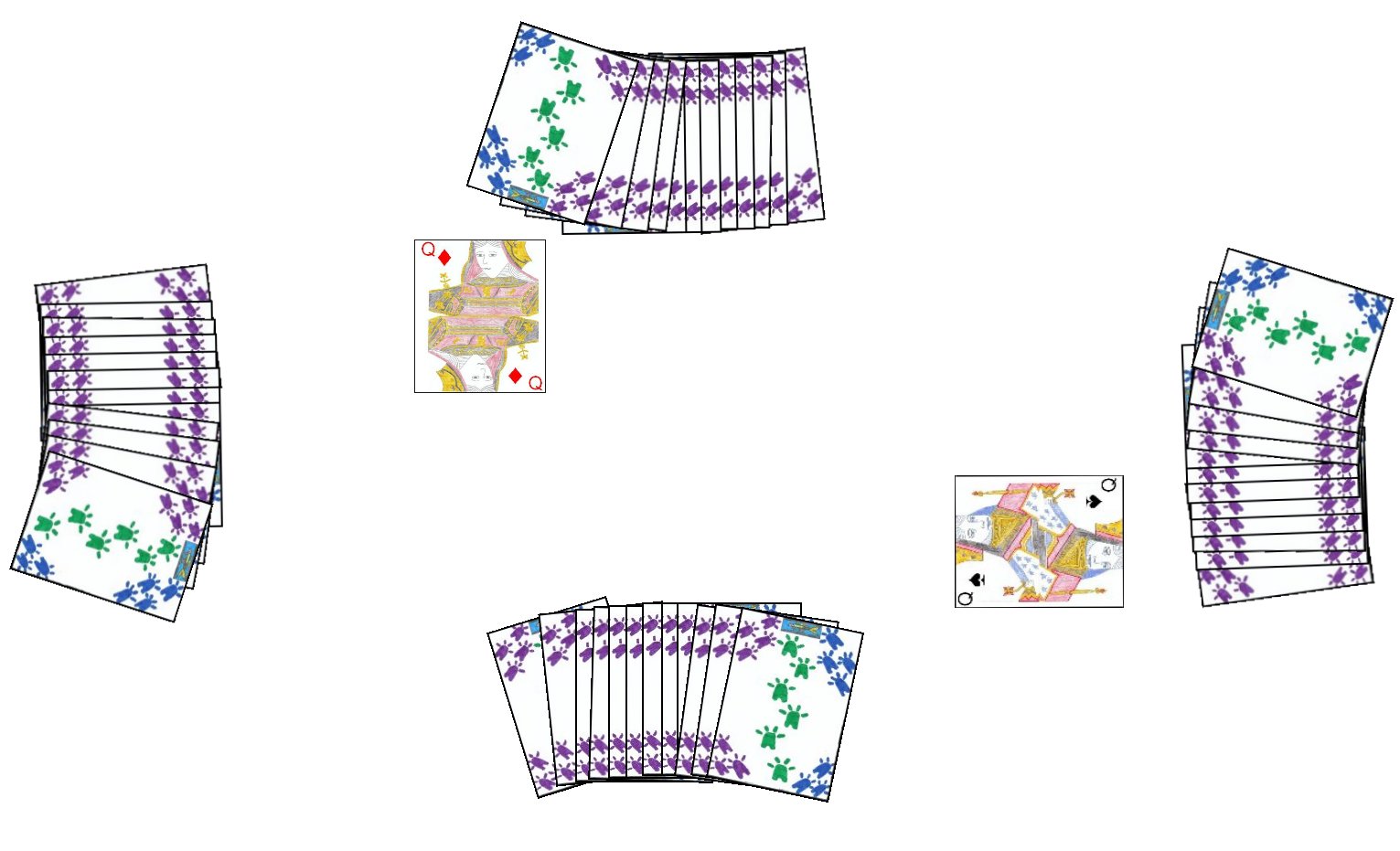
 Kingen is played over a series of exactly 10 deals. Each of the following deals is played, in order:
Kingen is played over a series of exactly 10 deals. Each of the following deals is played, in order:
